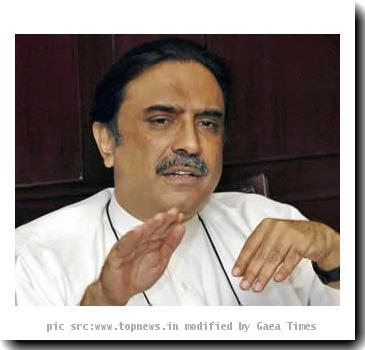Getting schooled: Scores of Pakistani lawmakers accused of claiming fake degrees
By Zarar Khan, APTuesday, June 29, 2010
Fake degree scandal roils Pakistani politics
ISLAMABAD — Scores of Pakistani lawmakers may lose their seats for allegedly lying about their academic credentials, a growing scandal that adds to the woes of the U.S.-backed leadership as it struggles with Islamist militancy and a weak economy.
What began as accusations against a handful of lawmakers has mushroomed into formal legal challenges against up to 160 elected officials — more than 10 percent of the country’s federal and provincial legislators. Many are said to have claimed fake degrees to meet a previous requirement for holding office.
The Supreme Court has ordered the Elections Commission to vet the credentials of nearly all of the some 1,100 federal and provincial lawmakers. If enough lawmakers are found ineligible, there are rumblings that a midterm election may be needed.
The scandal has drawn some frustrated reactions from lawmakers besieged by an aggressive media.
“A degree is a degree! Whether fake or genuine, it’s a degree! It makes no difference!” Baluchistan province chief minister Nawab Aslam Raisani, who claims a master’s in political science, shouted at a gaggle of reporters Tuesday.
The controversy has its roots in a 2002 law imposed by former military ruler Pervez Musharraf that required candidates for office hold a bachelor’s degree or equivalent. Musharraf supposedly wanted to improve the caliber of lawmakers, but critics said the move was more about sidelining certain opponents.
It also was undemocratic, critics alleged, in a country of 180 million where only 50 percent of adults are literate. Traditionally, feudal ties or business success count for more in politics than academic achievement.
Seven other countries — including Chile, Nigeria and Tajikistan — have constitutional provisions specifying an educational qualification for candidacy to the lower house of the national parliament, said Pippa Norris, who teaches at Harvard University’s John F. Kennedy School of Government.
Pakistan’s Supreme Court struck down the requirement in April 2008, but not before Musharraf allowed elections in February of that year. Analysts say many candidates apparently submitted fake degree papers to qualify for those races.
Many of the potentially fake degrees appear to have been claimed from Islamic seminaries, whose degrees are considered equivalent to a bachelor’s in Pakistan. Other lawmakers, however, claim to have earned bachelors, Ph.D.s or master’s degrees from institutions whose existence is difficult to verify.
One of the more unusual cases involved a provincial lawmaker, Rana Mubashir Iqbal. He recently resigned after accusations that he submitted a bachelor’s degree from Punjab University that had been awarded to another man by the same name. Iqbal said he resigned because he was asked to by his party, the opposition Pakistan Muslim League-N, not because he had lied.
The scandal appears to cut across party lines, so there may be support for quickly passing a law absolving the accused. But such a move may further tarnish the image of a political elite the majority of Pakistanis, who live in poverty, view as corrupt and indifferent to their needs.
Right now, those needs include an end to rolling blackouts due to chronic electricity shortages, curbing double-digit inflation on the prices of staple foods and goods, and rolling back the tide of al-Qaida and Taliban-led militancy that has cost numerous Pakistani lives.
“A common man can only regret having elected these cheats to the assemblies,” bemoaned one letter writer to “The News,” a major English-language daily.
Abid Sher Ali, the chairman of National Assembly’s education committee, said that to remove the stain of scandal, even the prime minister — who claims a master’s in journalism — has to prove his degree was legitimate.
“This is a process which will make us a great nation,” said Ali, who boasts a master’s degree in business and finance. “Nations have to sacrifice some individuals in the process of becoming great, so we should not be scared of the situation we’re facing now.”
The party that seems the most affected by the scandal is the opposition PML-N, thus dampening the appetite for a midterm election. The spokeswoman for the ruling Pakistan People’s Party, Fauzia Wahab, went so far as to say Tuesday that an early vote would “derail the democratic system.”
The ruling party chairman, Pakistani President Asif Ali Zardari, has claimed to hold a bachelor’s degree from a business school in London, but his party has been unable to produce a certificate or establish what he studied. Zardari will probably escape the latest scandal because he was elected after the degree requirement was struck down.
The offending lawmakers should not be dealt with harshly because the blame really lies on the degree requirement, imposed by an unelected man who took power in a coup, said Cyril Almeida, a political columnist, referring to Musharraf.
“We have to go back to the original sin,” said Almeida. He argued that to really stop corruption in Pakistani politics, courts should enforce laws governing campaign finance or proper disclosure of candidates’ assets.
In Pakistan, a country where political comebacks are common, it will probably take way more than a kerfuffle over the veracity of degrees to keep legislators out for long, especially since the old law doesn’t apply anymore.
Earlier this year, National Assembly member Jamshed Dasti resigned after being unable to prove in court that he held a master’s in Islamic studies. Media reports at the time said he couldn’t even name the first two chapters of the Quran.
Then, he ran in the special election for the same office he had just vacated, and won.
Associated Press Writer Babar Dogar in Lahore contributed to this report.
Tags: Asia, Asif Ali Zardari, Higher Education, Islamabad, Pakistan, Political Corruption, Political Issues, Political Scandals, South Asia

